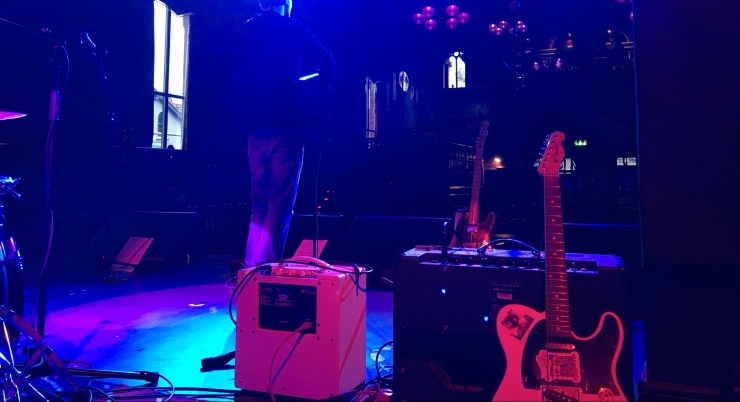Two Steps Towards Improving Independent Music In Northern Ireland
This was a piece written from a survey I carried out through my music website, Tin Man Heart. The survey asked musicians and those involved in music in Northern Ireland their thoughts on media engagement, career prospects, pay and conditions and how the public interacts with the local scene.
https://tmhmusic.com/2018/02/14/two-steps-towards-improving-independent-music-in-northern-ireland/
It’s a really exciting time to be involved in music in Northern Ireland at the minute. We have some great bands, excellent studios and producers to help those bands make their music and a few great venues to host events.But the structures around that are, in some cases, letting the talent of musicians and other creatives down. It feels like no matter how good a band is in this country, they will never have the wider general public onside until they’re legitimised by a label or media outlet somewhere else.Too many gigs involving local bands are poorly attended, meaning bands are playing to each other, bars don’t value the entertainment because it doesn’t drive sales, promoters can’t pay bands because they don’t make enough at the door and musicians struggle to generate enough money to promote themselves with better recording, PR, videos and touring. It’s a cycle which means there will always be a ceiling on what anyone can achieve here.

A survey of over 100 musicians recently carried out by this site found:
- 1 in 10 musicians rate opportunities for progression as good
- 70% said their involvement in music is not their full time job
- 75% say they rarely or never get paid to play gigs
- Nearly half (43%) say media in Northern Ireland is limited in its coverage of local music
- 9 in 10 (85%) say music media have a preference for certain acts which excludes others
- Three quarters (73%) of musicians say it’s difficult or near impossible to get people to attend gigs
The results don’t paint a positive picture of the scene here. Musicians don’t feel valued. They don’t feel that they have opportunities to reach their potential. Success, whatever that means to the individual musician, shouldn’t be handed to them, but there should be an environment in which it can be achieved.
That can be created with two relatively small steps:
Earlier gigsThis is one that many will disagree with but it’s a constant issue that midweek gigs start between 9pm and 10pm, and go on until after midnight. With seven in ten musicians here relying on other forms of employment it’s unreasonable to expect them to perform midweek beyond midnight. It’s even more unreasonable to expect anyone outside of music to attend those gigs. Musicians from support bands are often seen leaving gigs before the end because they have work the next day or are relying on public transport to get home. The same problem applies to people attending the gigs. People will go out on weeknight to see touring bands, where shows often start between 7pm and 8pm, so they aren’t averse to it. We just need them to come to more gigs involving local bands too. Which leads nicely on to…
Media interestEarlier gigs alone won’t be enough. We need to give people a reason to want to come to those gigs. Exposure to a wider audience is a huge part of that. Imagine if a couple of songs a day on Cool FM, Q Radio or U105 was sourced from a local artist or band. If that song was followed with a mention of an upcoming gig or where to find their latest music online, slowly the general public would become much more aware of bands in the area and gigs happening on their doorsteps. The average listener won’t recognise or like every single chart song played by these radio stations anyway, so the stations can’t be risking their listening figures (and therefore ad revenue) anymore than when they play any other new song (like Justin Timberlake’s recent flop). It’s free content for them and they would be seen to be leading the way in supporting local talent. It’s a win win and wouldn’t take much to realise.
Tin Man Heart artist Sonja Sleator says earlier gigs are one of the main obstacles to her having more support at gigs.“I love playing in Belfast, but it’s really difficult to encourage people to come out to a gig. No matter how good the bands are, and no matter how interested my friends are in supporting me the overriding issue is the lateness of gigs. The first question I’m always asked about my gig is, ‘What time are you on?”. I firmly believe gigs would be better attended if they started between 7 and 8 and finished by about 11, giving people the chance to get the last bus or train home.
"Like many musicians I also have to work to help make ends meet. The later gigs have a big impact on me. I have played midweek gigs where I wasn’t going on stage until nearly 11pm. I couldn’t get any family members or friends to come see me due to their work commitments and I completely understand. I don’t get home myself until after 1am. My supporters find it annoying and usually just say, ‘Sorry, if you were playing a bit earlier I would have come out’. Something needs to change.”
Of course there is much to do around promoting gigs outside of these avenues, and bands tend to have an over reliance on Facebook and social media to promote themselves. Inevitably there will be songs and bands that not everyone likes, but that’s music. Finding music through radio has worked for generations before us, and radio is our greatest potential ally. Make people familiar with the music and they’ll soon take the leap and come see a band live.
Comments
Post a Comment